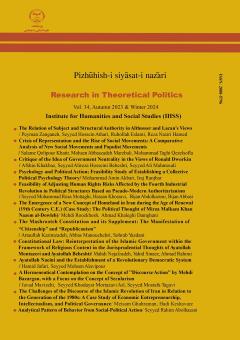Critique of the Idea of Government Neutrality in the Views of Ronald Dworkin
Subject Areas : پژوهش سیاست نظری
افشین خاکباز
1
![]() ,
seyed alireza Hoseyni Beheshti
2
,
seyed alireza Hoseyni Beheshti
2
![]() ,
Sayed Ali Mahmoudi
3
,
Sayed Ali Mahmoudi
3
1 - Ph.D Student of Political Thought, Tarbiat Modares University, Iran.
2 - Assistant Professor, Political Science Department, Tarbiat Modares University, Iran.
3 - Professor, Department of Political Science, Faculty of International Relations, Ministry of Foreign Affairs, Iran.
Keywords: Ronald Dworkin, State neutrality, Autonomy, Authenticity, Paternalism. ,
Abstract :
Critique of the Idea of Government Neutrality
in the Views of Ronald Dworkin
Afshin Khakbaz*
Seyyed Alireza Hosseini Beheshti **
Seyyed Ali Mahmoudi***
One of the fundamental concepts that categorizes intellectuals who speak within the framework of liberalism into various groups is autonomy itself and its limits and boundaries. Among these categories, one can refer to the division between supporters of government neutrality and perfectionism, or in other words advocates of non-intervention or government intervention in relation to different aspects of life, which place liberal thinkers in two distinct camps in terms of the limits and boundaries they advocate for. Dworkin constructs his theory of equality based on two principles of concern and equal respect and unique responsibility and extracts government neutrality and autonomy from these two principles. Like many advocates of government neutrality, he attaches importance to autonomy; however, he does not endorse absolute autonomy and advocates for limits and boundaries. He distinguishes between autonomy and authenticity, considering autonomy to have a narrower scope than authenticity. Dworkin, while opposing the adoption of paternalistic policies by the government, does not outright negate government intervention in various areas of political and social life, deeming such interventions to some extent necessary and unavoidable. This article, utilizing a descriptive-analytical approach, critically examines the concept of autonomy and its position in Dworkin's intellectual framework and seeks to answer the question of what place autonomy and consequently neutrality hold in Dworkin's thought. Ultimately, this article concludes that although the restriction of autonomy in his views, especially regarding equality in resources, is more than he admits, a paternalistic viewpoint stands out in certain aspects of his theory of resource equality.
Keywords: Ronald Dworkin, State neutrality, Autonomy, Authenticity, Paternalism.
* Corresponding Author: Ph.D Student of Political Thought, Tarbiat Modares University, Iran.
afshinkhakbaz2012@gmail.com
** Assistant Professor, Political Science Department, Tarbiat Modares University, Iran.
abeheshti2002@yahoo.com
*** Professor, Department of Political Science, Faculty of International Relations, Ministry of Foreign Affairs, Iran.
mahmoudi3000@gmail.com
